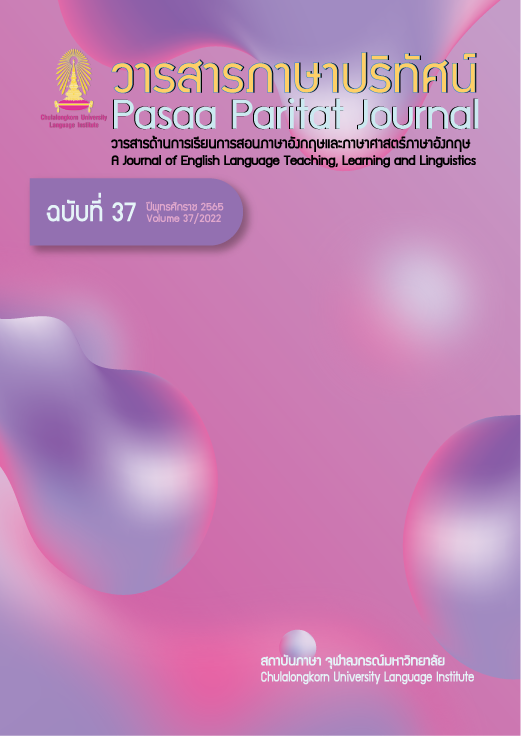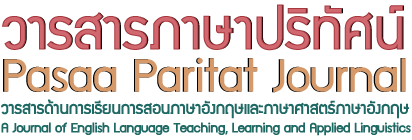Using Noticing Technique to develop English Essay Writing for Third Year Undergraduate Students of Rajamangala University of Technology Tawan-Ok
DOI:
https://doi.org/10.58837/CHULA.PPJ.37.5คำสำคัญ:
เทคนิคการสังเกต, ข้อผิดพลาดทางไวยากรณ์, การเขียนเรียงความบทคัดย่อ
This study aimed to assess the effectiveness of English essay writing skills and student attitudes towards the noticing technique among third-year undergraduates at Rajamangala University of Technology Tawan-Ok. The research spanned eight weeks and four phases, involving 129 students from two campuses Academic Year B.E. 2563.Phase 1 was grammatical error identification. The researchers had students take a pre-test of grammatical features regarding the parts of speech. Phase 2 was the Input implementation of the three steps: pre-noticing technique, while-noticing technique, and post-noticing technique. Two tests were compared and analyzed using Independent-t-test statistics. Phase 3 was the interview by interviewing 10 samples, classified by the score differences between pre-and post-test of the top five and the bottom five students. Phase 4 was Intake application. At the end of the process, in the eighth week, students were assigned to write their essays on an assigned topic. The counted number of grammatical errors was compared to that of the number of errors found in the post-test (Phase 2). The following results were found. 1) The pre-test and the post-test of grammatical issues had a mean score of 14.47 or 42.39%, and 24.11 or 70.65%, respectively. 2) After the noticing technique intervention, the results of the post-test grammatical errors (Phase 2) were compared with those in their essays (Phase 4) were as follows. The verb errors were distinctively reduced (23%, 17%), with a slight decrease in nouns (24%, 22%) and adverbs (12%, 11%), but pronoun errors were stable (13%, 13%). However, errors in the use of prepositions noticeably increased (12%, 16%), while those involving conjunctions and adjectives slightly increased by (6%, 9%) and (10%, 12%) respectively. 3) The students had positive attitudes toward the noticing technique. In conclusion, this technique can potentially be used as another alternative instructional strategy, scaffolding the students’ essay writing ability with the additional guidelines of the instructors.
เอกสารอ้างอิง
Al Khatib, H. M. (2019). The effectiveness of the noticing technique in improving the grammatical accuracy of EFL learners' writing.
International Journal of Linguistics, Literature and Translation, 2(4), 38–45.
Alsowat, A. A. (2022). The effectiveness of using hybrid learning to improve students’ essay writing: A systematic review. Journal of Educational
Technology & Society, 25(1), 139–149.
Barkaoui, K. (2007). Teaching writing to second language learners: Insights from theory and research. TESL-EJ, 11(1), 1–15.
Barnawi, O. Z. (2010). Promoting noticing through collaborative feedback tasks in EFL college writing classroom. International Journal of
Teaching and Learning in Higher Education. Retrieved November 20, 2022, from http://www.isetl.org/ljthe/
Batstone, R. (1996). Key concepts in ELT: Noticing. ELT Journal, 50(3), 8 Paragraphs. Retrieved November 20, 2022, from
http://www3.oup.uk/eltj/hdb/Volume_50/issue_03/freepdf/500273.pdf
Barnet, S., Bellanca, P., & Stubbs, M. (2013). A short guide to college writing (5th ed.). Boston, Pearson.
Cai, Y., & Zhang, W. (2019). The effectiveness of the noticing technique in improving the use of passive voice in EFL writing. Journal of
Language Teaching and Research, 10(5), 991–1001.
Chang, Y. J., & Wu, K. Y. (2012). Noticing and writing development: Incorporating noticing into a writing program to enhance EFL students' use
of grammatical structures. Journal of Second Language Writing, 21(3), 243–258.
Chen, C., & Cheng, W. (2016). The impact of peer feedback on the essay writing skills of EFL students in a higher education context. Journal of
English for Academic Purposes, 21, 1–16.
Chen, Y., & Cheng, W. (2015). The effects of teacher feedback on essay writing in a Chinese tertiary EFL classroom. English Language Teaching,
(6), 32–41.
Cho, K. L., & Schunn, C. D. (2007). Scaffolded writing and rewriting in the discipline: A web-based reciprocal peer review system. Computers &
Education, 48(3), 409–426.
Cook, T. D., & Campbell, D. T. (1979). Quasi-Experimentation: Design & Analysis Issues in field Settings. Boston, MA: Houghto Mifflin.
Ellis, R. (1994). The study of second language acquisition. Oxford University Press.
Ellis, R. (2005). Measuring implicit and explicit knowledge of a second language: A psychometric study. Studies in Second Language
Acquisition, 27(2), 141–172.
Etikan, I., Musa, S. A., & Alkassim, R. S. (2016). Comparison of convenience sampling and purposive sampling. American Journal of Theoretical
and Applied Statistics, 5(1). http://doi:10.11648/j.ajtas.20160501.11.
Graff, G., & Birkenstein, C. (2010). They say, I say: The moves that matter in academic writing. WW Norton & Company.
Gupta, R., & Bansal, P. (2013). Effectiveness of essay writing training on improving the writing ability of rural medical students. Education in
Medicine Journal, 5(2), 28–31.
Haynie, W. J. (1997). Effect of Anticipation of Tests on Delayed Retention Learning. Journal of Technology Education, 9(1) Fall.
Huang, S., & Guthrie, J. T. (2014). Modeling the roles of cognitive and motivational resources in reading comprehension. Journal of
Experimental Education, 82(2), 191–218.
Ismail, H. & Nor, N.M. (2017). The effect of teaching parts of speech on students’ writing achievement. Journal of Education and Practice, 8(6),
–121.
Khandagale, D. D. (2016). Enhancing academic writing skills through a research-based model: A case of a teacher education institution.
International Journal of English Language, Literature and Humanities, 4(2), 601–615.
Kılıçkaya, F., & Daloğlu, A. (2020). The relationship between grammatical accuracy and writing proficiency among Turkish university students.
International Journal of Language and Linguistics, 8(3), 63–73.
Kisa, A., & Yildiz, S. (2020). English as a foreign language learners’ essay writing difficulties in an online environment. Journal of Language and
Linguistic Studies, 16(4), 1909–1931.
Khumpee, S & Yodkamlue, B. (2017) Grammatical errors in English essays written by Thai undergraduate students. Journal of Education, 11(4)
October–December.
Lavelle, E., Smith, C., & O'Ryan, L. (2002). The effect of computer-mediated conferencing on the quality of subsequent written argument.
Journal of Interactive Learning Research, 13(1), 29–49.
Liu, J., & Jiang, M. (2018). The relationship between parts-of-speech knowledge and essay writing performance among Chinese EFL learners.
Journal of English for Academic Purposes, 34, 16–26.
Liu, J., & Hansen, J. G. (2002). Pre-writing activities and their effects on the quality of essays written by fifth-grade students of English as
a foreign language. Asian Journal of English Language Teaching, 12(1), 1–14.
Liu, J., & Zhang, Y. (2010). Explicit instruction on parts of speech and quality writing. Language Awareness, 19(4), 303–319.
Liu, M., Chen, W., & Cheng, W. (2016). Effects of feedback on writing quality in a web-based peer - assessment system. Journal of Educational
Technology & Society, 19(3), 214–225.
Lyster, R., & Ranta, L. (2013). Corrective feedback and learner uptake: Negotiation of form in communicative classrooms. Studies in Second
Language Acquisition, 35(1), 167–206.
Manochiopinij, S., & Taweesuk, S. (2020). The effectiveness of the noticing technique through writing competition in improving students’
grammatical accuracy and complexity. 3L: Language, Linguistics, Literature®, 26(4), 70–85.
Mulyati, L., & Hadianto, T. (2003). Improving argumentative writing: Effects of a model for critical thinking instruction on students'
performances in an argumentative writing task. The Journal of Asia TEFL, 1(1), 31–60.
Muraoka, T. (2019). The relationship between parts of speech knowledge and Japanese university students’ writing quality. Journal of Writing
Research, 11(3), 439–461.
Nassaji, H., & Fotos, S. (2011). Teaching grammar in second language classrooms: Integrating form-focused instruction in communicative
context. New York, NY: Routledge
Phillips, D. (2001). Longman Complete Course for the TOEFL Test: Preparation for Paper and Computer Test. Pearson Education: New York
Pidaparti, R. M. (2015). The importance of understanding parts of speech in writing. International Journal of Applied Linguistics & English
Literature, 4(3), 1–6.
Qin, Y., & Wen, Q. (2018). The effectiveness of the noticing technique in improving the use of grammatical collocations in EFL writing. Theory
and Practice in Language Studies, 8(4), 386–392.
Rahman, M. A., & Rahman, M. M. (2015). The effectiveness of the noticing technique in the development of parts of speech knowledge and
essay writing. International Journal of English Language and Linguistics Research, 3(2), 25–41.
Reco, R. M., & Sanchez, M. M. (2018). Difficulties in essay writing among undergraduate students: A case study. Higher Education Studies,
(4), 56–66.
Saengboonmee, N. (2017). The use of noticing techniques to improve grammatical accuracy in essay writing. Indonesian Journal of Applied
Linguistics, 6(2), 389–398.
Schleppegrell, M. J., & Colombi, M. C. (2002). Developing advanced literacy in first and second languages: Meaning with power. Mahwah, NJ:
Lawrence Erlbaum.
Schmidt, R. (1990). The role of consciousness in second language learning. Applied Linguistics, 11(2), 129–158.
Schmidt, R. (1993). Awareness and second language acquisition. Annual Review of Applied Linguistics. (13), 206–226.
Schmidt, R. (1995). Consciousness and foreign language learning: A tutorial on the role of attention and awareness in learning. Attention and
awareness in foreign language learning, 1–64.
Schmidt, R., & Frota, S. (1986). Developing basic conversational ability in a second language: A case study of an adult learner of Portuguese.
In R. Day (Ed.), Talking to learn: Conversation in second language acquisition, (pp. 237–327). New Rowley, MA: Newbury House.
Srikrachang, W. (2017). Using the noticing technique to improve students' grammar in writing: A case study of Thai EFL students. International
Journal of Language and Linguistics, 4(2), 77–89.
Sultana, N., & Hossain, M. (2017). The problems of English language learning and teaching in Bangladesh. Journal of Education and Practice,
(1), 120–126.
Swales, J. M., & Feak, C. B. (2004). Academic writing for graduate students: Essential tasks and skills. University of Michigan Press.
Sweller, J., Ayres, P., & Kalyuga, S. (2011). Cognitive load theory. Springer.
Vora, M. & Joshi, P. (2016). The Importance of Parts of Speech in English Language Learning. International Journal of English Language,
Literature and Humanities, 4(3), 56–64.
Wang, J., & Wen, Q. (2018). An investigation of the common grammatical errors in the English writing made by students from vocational
colleges in the context of China. English Language Teaching, 11(9), 165–175.
Wang, R., & Li, H. (2019). The effects of direct and indirect feedback on grammatical accuracy in essay writing. International Journal of
Educational Technology in Higher Education, 16(1), 1–13.
Yang, J. H., & Huang, S. C. (2018). A multimodal approach to teaching parts of speech to enhance writing skills. English Teaching & Learning,
(2), 123–147.
Yildirim, S., & Tatar, S. (2017). The ¬¬effects of noticing-focused activities on the acquisition of adjective forms and functions. Journal of
Language and Linguistic Studies, 13(2), 216–235.
Zhang, L. (2018). Vocabulary size and essay writing proficiency: A meta-analysis. English Language Teaching, 11(2), 41–53.
Zhang, L., & Yang, X. (2021). Noticing-based approach to improving the use of parts of speech in Chinese non-English majors’ English essay
writing. Studies in Second Language Learning and Teaching, 11(3), 511–528.
ดาวน์โหลด
เผยแพร่แล้ว
รูปแบบการอ้างอิง
ฉบับ
ประเภทบทความ
สัญญาอนุญาต

อนุญาตภายใต้เงื่อนไข Creative Commons Attribution-NonCommercial-NoDerivatives 4.0 International License.



